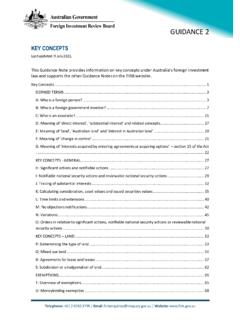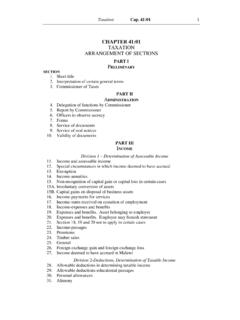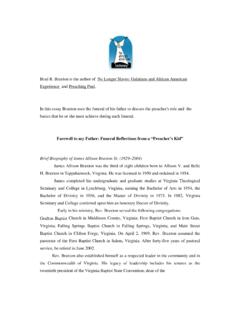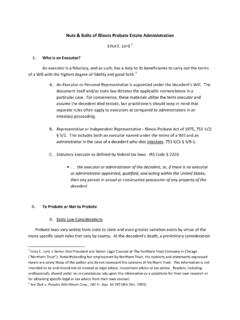Transcription of Australia's foreign investment policy
1 AUSTRALIA S foreign investment policy 1 January 2021 i Commonwealth of Australia 2021 This publication is available for your use under a Creative Commons Attribution Australia licence, with the exception of the Commonwealth Coat of Arms, the Treasury logo, photographs, images, signatures and where otherwise stated. The full licence terms are available from Use of Treasury material under a Creative Commons Attribution Australia licence requires you to attribute the work (but not in any way that suggests that the Treasury endorses you or your use of the work). Treasury material used as supplied . Provided you have not modified or transformed Treasury material in any way including, for example, by changing the Treasury text; calculating percentage changes; graphing or charting data; or deriving new statistics from published Treasury statistics then Treasury prefers the following attribution: Source: The Australian Government the Treasury.
2 Derivative material If you have modified or transformed Treasury material, or derived new material from those of the Treasury in any way, then Treasury prefers the following attribution: Based on The Australian Government the Treasury data. Use of the Coat of Arms The terms under which the Coat of Arms can be used are set out on the Department of the Prime Minister and Cabinet website (see ). Other uses Enquiries regarding this licence and any other use of this document are welcome at: Manager Media and Speeches Unit The Treasury Langton Crescent Parkes ACT 2600 Email: AUSTRALI A S FOREI GN I NVESTMENT POLI CY 2 Contents ii Our approach .. 3 The foreign investment review framework .. 3 Who needs foreign investment approval?.. 4 Non-government foreign 4 Acquisitions of Australian Land.
3 5 foreign government investors .. 7 7 Other 8 How are proposed investments screened?.. 8 The national interest 9 The national security 11 Applications .. 12 12 How long before a decision i s made?.. 12 Confidentiality and pri vacy .. 12 13 Enquiries .. 13 Annex 1: Monetary thresholds .. 15 Non-Land Proposal s .. 15 Land Proposals .. 16 Our approach 3 Our approach The Australian Government welcomes foreign investment for the significant benefits it provides, while recognising the need to ensure investments are not contrary to the national interest. foreign investment has helped build Australia s economy, and it will continue to enhance the wellbeing of Australians by supporting economic growth and innovation into the future. Without foreign investment , production, employment and income would all be lower.
4 foreign investment brings many benefits. It supports existing jobs and creates new jobs, encourages innovation and the induction of new technologies and skills, provides access to markets and promotes competition amongst our industries. The Government reviews foreign investment proposals on a case-by-case basis to ensure they are not contrary to the national interest1. This flexible approach is preferred to hard and fast rules. Rigid laws that prohibit a class of investments too often also stop valuable investments. The case-by-case approach maximises investment flows, while protecting Australia s interests. The Government works with applicants to ensure the national interest is protected. If it is ultimately determined that a proposal is contrary to the national interest, it will not be approved, or conditions will be applied to safeguard the national interest.
5 The Government expects all investors (both foreign and domestically-owned) to comply with Australia s laws and maintain high standards of conduct at all times. This includes following both the spirit and the letter of Australian law, and acting in good faith in complying with any conditions imposed by the Government. foreign investors should familiarise themselves with Australia s foreign investment framework and ensure they comply with the law. Failure to do so may result in the imposition of penalties. The foreign investment review framework The foreign investment review framework is set by the foreign Acquisitions and Takeovers Act 1975 (the Act) and the foreign Acquisitions and Takeovers Fees Impositions Act 2015 (Fees Imposition Act), along with their associated regulations.
6 The Act requires foreign investors to notify the Treasurer of proposed foreign investments that meet certain criteria. The Treasurer has the power to prohibit these investments, or apply conditions to the way they are implemented, to ensure they will not be contrary to the national interest or national security (as applicable). The overwhelming majority of proposed investments are approved. In accordance with the Fees Imposition Act, foreign investors must pay an application fee when notifying the Treasurer of a proposed investment . This ensures that Australian taxpayers do not bear the cost of administering the foreign investment review framework. When making foreign investment decisions, the Treasurer is advised by the foreign investment Review Board (FIRB), which examines foreign investment proposals and advises on the national interest implications.
7 FIRB is a non-statutory advisory body. Responsibility for making decisions rests with the Treasurer. 1 In certain circumstances, only national security considerations are taken into account. See page 10 for further deta i l s on the na tional s ecurity tes t. AUSTRALI A S FOREI GN I NVESTMENT POLI CY 4 FIRB is supported by a secretariat located in the Department of Treasury (Treasury) and by the Australian Taxation Office (ATO). Treasury is responsible for the day to day administration of the framework in relation to business, agricultural land and sensitive commercial land proposals. The ATO administers foreign investment into residential real estate, as well as non-sensitive commercial land and internal reorganisation proposals.
8 The FIRB website ( ) provides a number of Guidance Notes that are designed to help investors understand their obligations under the foreign investment framework. They are provided for guidance only and should be read in conjunction with the legislation. Australia has sought to liberalise trade and investment through Free Trade Agreements (FTAs) and will honour its commitments under those agreements. The commitments include negotiated higher foreign investment screening thresholds for certain investors. All proposed investments will, however, continue to be screened consistently, regardless of the country of investor. Who needs foreign investment approval? Whether a foreign person is required to notify the Treasurer of their proposed investment will depend on a number of factors including: whether the investor is a foreign government or non-government investor; the type of acquisition; whether the investment is likely to raise national security concerns; the monetary thresholds relevant to the investment2; and any FTA commitments.
9 A foreign person is generally: an individual that is not ordinarily resident in Australia; or a foreign government or foreign government investor; or a corporation, trustee of a trust or general partner of a limited partnership where an individual not ordinarily resident in Australia, foreign corporation or foreign government holds a substantial interest of at least 20 per cent; or a corporation, trustee of a trust or general partner of a limited partnership in which two or more foreign persons hold an aggregate substantial interest of at least 40 per cent. A foreign government investor is: a foreign government or separate government entity; or a corporation, the trustee of a trust, or a general partner of a limited partnership, in which: a foreign government or separate government entity holds a substantial interest of at least 20 per cent; or foreign governments or separate government entities of more than one foreign country (or parts of more than one foreign country) hold an aggregate substantial interest of at least 40 per cent.
10 foreign investors should seek independent legal advice if they have any doubt as to whether an investment is notifiable. Non-government foreign investors Business Acquis itions foreign persons must get approval before acquiring a substantial interest (generally at least 20 per cent) in an Australian entity that is valued above the relevant monetary threshold. 2 The monetary thresholds are outlined in Annex 1. The for ei gn i nvestment r eview fr amework 5 Consistent with Australia s FTA commitments, a higher monetary threshold applies for investors from certain free trade agreement countries investing in non-sensitive businesses3. National security businesses foreign persons must get approval before acquiring a direct interest (generally at least 10 per cent) in a national security business, or starting a national security business, regardless of the value of the business or the country of the investor.









